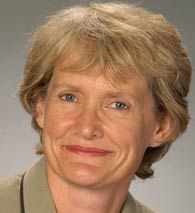|
Executive Interviews: Interview with Eileen Fischer on Steve Jobs
March 2010 - By Dr. Nagendra V Chowdary
 Eileen Fischer
Eileen Fischer David Conklin, is a Professor of Marketing and the Anne and Max Tanenbaum Chair in Entrepreneurship and Family Enterprise 
-
While Randall E Stross (the
author of Steve Jobs & The NeXt Big
Thing)described Steve Jobs as,
‘arrogantly oblivious’, ‘unmerciful’,
and an ‘unapologetic snob’ who is
‘imprisoned…by his selected
historical memory’, others describe
him as ‘the perfectionist’, who ‘sets
expectations for quality, challenging
the status quo, and never accepts no
for an answer’, ‘too good a human
being’ and ‘unparalleled institutional
builder’, etc. Who is the real Steve
Jobs?
The Jobs persona has been co-created
by the media and the role of those
who write about Jobs in contributing
to what we ‘know’ about him should
never be underestimated. The person
behind the persona is likely to be as
complex and contradictory as most
people are.
-
Commenting on Steve Jobs, Andy
Grove said, “There’s no other
company in technology that’s started
with a strong core business and
developed another very strong one.
The rest of us are lucky, or good (if
we’re) right once”. How could Steve
Jobs be right more than once? Was it
his predictive abilities or iconoclastic
arrogance?
There is a tendency for people to
overestimate the extent to which one
person is responsible for the success
of a company. Groves’ quote about
developing a very strong core
business more than once doesn’t
actually attribute all of that
achievement to Jobs. It’s important
not to overlook the role of the many
people who work (or have worked)
for Apple and what they have
contributed. There is also a big role
played by factors outside the control
of any company in how it fares in the
marketplace.
-
Many argue that he is reclusive
and secretive and end up describing
his leadership as secretive leadership
and quote examples for similar kind
of leadership from Phil Knight, Ratan Tata, etc. Is there any such thing as a
secret leadership? What would be the
impact of such leadership on the
organization in the short run and in
the long run?
Leadership styles certainly do vary
across people. And even over time,
the same person can vary in terms of
how he leads. I can’t comment on
whether Jobs has a secretive
leadership style, or what its impact is,
if he does.
-
In November 2009, Fortune
named Steve Jobs as the CEO of the
Decade. In the accompanying cover
story (‘The Decade of Steve: How
Apple’s imperious, brilliant CEO
transformed American business’),
Adam Lashinsky, Fortune’s editor-atlarge
observed, ‘Remaking any one
business is a career-defining
achievement; four (movies (Pixar),
Music (iPod), Mobile (iPhone) and
Computers) is unheard of.’ How
could he redefine the competitive
landscape of four different industries,
singlehandedly? What do you think
were the critical success factors in
such a pronounced victory?
While Jobs is a remarkable
individual, I think suggesting that he
has singlehandedly redefined the
competitive landscape of four
different industries is excessive.
Many players, individual and
institutional, contribute to the way
industries unfold. The success of
Apple’s offerings have been that they
meet needs better than other offerings
in the same or adjacent market
spaces. Design aesthetics and
functionality are certainly key
contributors to the success of Apple’s
diverse offerings. To the extent that
Jobs has helped keep his company
focused on doing design in ways that
delight consumers, and in making
products that allow consumers to do
things they couldn’t otherwise do as
well, there is genius.
|
